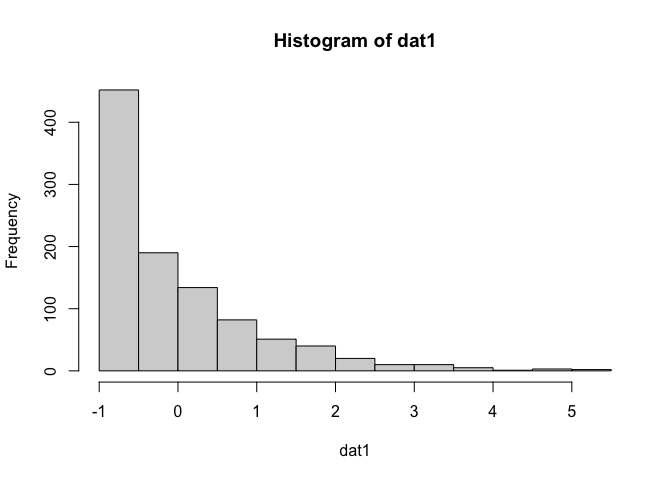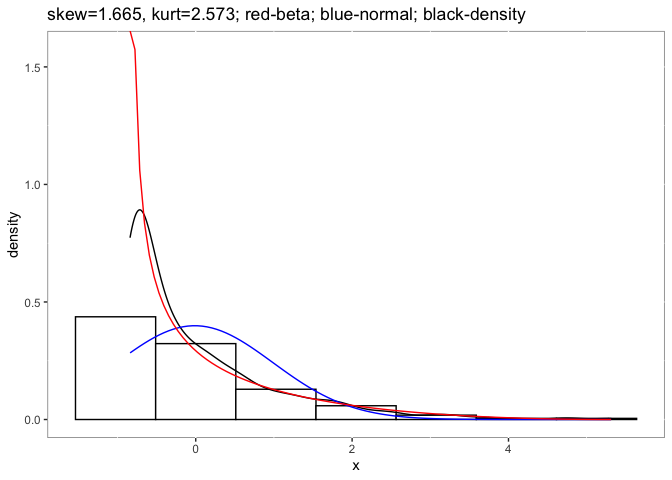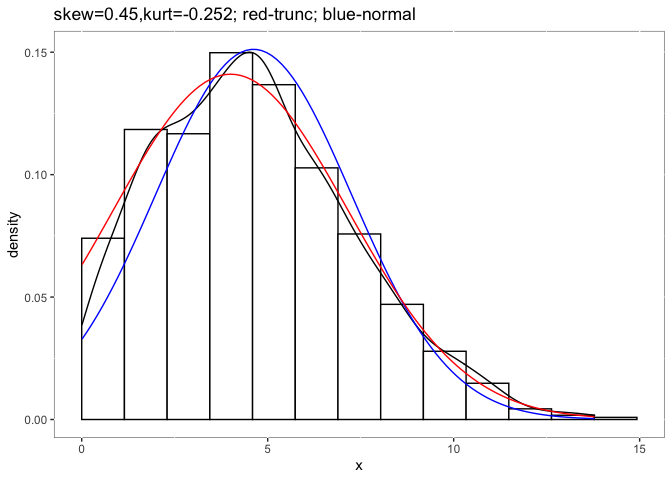Detect Nonnormality in Meta-Analysis without Raw Data.
detectnorm: A Packcage for Detectng Non-normality
Description
The goal of detectnorm is to speculate the skewness and kurtosis based on the Beta and truncated normal distribution. When conducting a meta-analysis for two independent groups, we generally retrieved very limited statistics from primary studies, and it is hard to access the raw data. However, the non-normality of raw data could influence the meta-analytic results greatly (Sun & Cheung, 2020). This package allows meta-analysis researchers to speculate the skewness and kurtosis of the raw data, even without the raw data. Instead of normal distribution, if the researcher believes the population distribution is non-normal, then beta-distribution could be a good choice. If the researcher believes the population distribution is normal but truncated by the measuring ability of the instrument, then truncated normal distribution is a good option. The package provides not only the skewness and kurtosis estimates but also the figures to visualize them. Now, this package could work directly with the standardized mean difference for two independent groups. It also works for one group of data.
Documentation
A good start to understand the problems of non-normality in primary studies on meta-analytic results is the following paper:
Sun, R. W., & Cheung, S. F. (2020). The influence of nonnormality from primary studies on the standardized mean difference in meta-analysis. Behavior Research Methods, 52(4), 1552-1567.
Installation
You can install the official version within R with:
install.packages("detectnorm")
You can also install the development version of detectnorm from GitHub with:
# install.packages("devtools")
devtools::install_github("irissun/detectnorm")
Example
This is a basic example which shows you how to solve a common problem:
For one study if you assumed non-normal distribution in population:
library(detectnorm)
# Situations using beta distributions
set.seed(32411)
#Using Fleishman's method to generate non-normal data
dat1 <- rnonnorm(n = 1000, mean = 0, sd = 1, skew = 2, kurt = 5)$dat
hist(dat1)

psych::describe(dat1)
#> vars n mean sd median trimmed mad min max range skew kurtosis se
#> X1 1 1000 -0.01 1 -0.38 -0.2 0.63 -0.84 5.31 6.15 1.88 4.16 0.03
#Suppose we don't know about the raw data
result <- desbeta(vmean = mean(dat1), vsd = sd(dat1),lo = min(dat1), hi = max(dat1), showFigure = TRUE, rawdata = dat1)
#> [1] "mean is -0.0125212643739019"
#> [1] "sd is 0.999848046282588"
#> [1] "min. is -0.839243624241584"
#> [1] "max. is 5.31239864959992"
result
#> $dat
#> alpha beta mean sd skewness kurtosis
#> 1 0.4574073 2.946161 0.1343905 0.1625335 1.665152 2.572622
#>
#> $fig

For one study if you assumed normal distribution in population with truncated by the measurements:
library(detectnorm)
#Truncated normal distribution
set.seed(34120)
dat2 <- truncnorm::rtruncnorm(n = 1000, a = 0, b = 14, mean = 4, sd = 3)
psych::describe(dat2)
#> vars n mean sd median trimmed mad min max range skew kurtosis se
#> X1 1 1000 4.62 2.64 4.43 4.48 2.76 0.01 13.79 13.78 0.48 -0.13 0.08
destrunc(vmean=mean(dat2), vsd=sd(dat2), lo=0, hi=14, rawdata = dat2, showFigure = TRUE)
#> [1] "mean is 4.62042980360421"
#> [1] "sd is 2.63886011983622"
#> [1] "min. is 0"
#> [1] "max. is 14"
#> $dat
#> pmean psd tm tsd skewness kurtosis
#> 1 4.002982 3.15366 4.62043 2.63886 0.4499033 -0.252266
#>
#> $fig

For one meta-analysis of two independent groups. It is very similar to the requirements for package metafor only you need to add one or two columns for each group about the possible minimum and maximum of the data. It will add information including:
g1_alpha,g1_beta,g2_alpha, andg2_betaare the shape parameters of beta distributions;g1_mean,g1_sd,g2_mean,g2_sdare the means and standard deviations of the standard beta distribution (ranged from 0 to 1);g1_skewness,g1_kurtosis,g2_skewness, andg2_kurtosisare the skewness and kurtosis of the two groups.
In this example, it has contained the empirical skewness skew1 and skew2, which are calculated from raw data.
library(detectnorm)
# examine the meta-analysis dataset by simulating extremely non-normal distribution
# population mean1 = 1, mean2 = 1.5, sd1 = sd2=1, skewness1 = 4, kurtosis2 = 2, skewness2=-4, kurtosis2=2
data("beta_mdat")
beta1 <- detectnorm(m1i = m1,sd1i = sd1,n1i = n1, hi1i = hi1,lo1i = lo1,m2i = m2,sd2i = sd2,n2i = n2, hi2i = hi2,lo2i=lo2,distri = "beta", data = beta_mdat)
head(beta1)
#> study n1 m1 sd1 lo1 hi1 n2 m2 sd2
#> 1 1 160 1.0259203 0.8995642 0.2083603 5.578894 160 1.430021 1.0598447
#> 2 2 34 1.1528144 1.1367622 0.2123795 4.932592 34 1.408080 0.9296092
#> 3 3 57 0.9959042 0.8760782 0.2089018 3.443021 57 1.508927 1.0423997
#> 4 4 155 0.9480018 0.8828343 0.2082652 3.934242 155 1.443682 0.9198336
#> 5 5 149 1.1162247 1.0968963 0.2081850 5.613920 149 1.444312 1.0826183
#> 6 6 132 1.0418582 0.8946956 0.2082168 4.301961 132 1.554712 0.7932896
#> lo2 hi2 skew1 skew2 g1_alpha g1_beta g1_mean g1_sd
#> 1 -3.177617 2.274204 1.788613 -2.230054 0.5480186 3.051904 0.1522307 0.1674999
#> 2 -1.296619 2.271800 1.655752 -1.232207 0.3488177 1.401962 0.1992357 0.2408286
#> 3 -2.287307 2.274883 1.292354 -1.627030 0.3672680 1.141989 0.2433436 0.2708861
#> 4 -2.072880 2.274900 1.530104 -1.560090 0.3641696 1.470115 0.1985349 0.2369403
#> 5 -4.294234 2.274901 1.541182 -2.244364 0.4022054 1.992201 0.1679771 0.2029134
#> 6 -2.987192 2.273312 1.508507 -2.096631 0.4877450 1.907413 0.2036379 0.2185519
#> g1_skewness g1_kurtosis g2_alpha g2_beta g2_mean g2_sd g2_skewness
#> 1 1.483046 1.8901609 2.081468 0.3813533 0.8451559 0.1944020 -1.591348
#> 2 1.331854 0.8377363 1.291009 0.4122712 0.7579545 0.2605101 -1.069528
#> 3 1.079966 0.0309162 1.394623 0.2813890 0.8321080 0.2284867 -1.581618
#> 4 1.327314 0.8548620 1.985434 0.4693019 0.8088177 0.2115640 -1.310686
#> 5 1.489420 1.5984400 2.678914 0.3877426 0.8735618 0.1648038 -1.789508
#> 6 1.234109 0.7489875 3.614481 0.5718672 0.8633971 0.1508011 -1.558126
#> g2_kurtosis
#> 1 2.00489688
#> 2 0.07531228
#> 3 1.66667585
#> 4 1.00447883
#> 5 3.02270945
#> 6 2.29997673
#compare the sample skewness and estimated skewness using beta distribution
mean(beta1$skew1)#sample skewness calculated from the sample in group 1
#> [1] 1.687593
mean(beta1$g1_skewness) #estimated using beta in group 1
#> [1] 1.384237
mean(beta1$skew2) #sample skewness calculated from the sample in group 2
#> [1] -1.687784
mean(beta1$g2_skewness)#estimated using beta in group 2
#> [1] -1.411431
library(detectnorm)
data("trun_mdat")
head(trun_mdat)
#> study n1 m1 sd1 lo1 hi1 n2 m2 sd2
#> 1 1 199 1.297501 0.8203794 0.0061563102 3.611959 199 1.572915 0.9002734
#> 2 2 77 1.325658 0.7750929 0.0231261133 2.889290 77 1.597681 0.8782761
#> 3 3 166 1.212825 0.7460359 0.0158618581 3.607032 166 1.612654 0.8441273
#> 4 4 120 1.230577 0.7888702 0.0030294235 3.443851 120 1.598539 0.8776627
#> 5 5 175 1.279821 0.7477283 0.0002848415 3.409888 175 1.612636 0.8426223
#> 6 6 47 1.310062 0.8904328 0.0088877511 3.729032 47 1.613387 0.8375352
#> lo2 hi2 skew1 skew2
#> 1 0.02056929 3.654732 0.4925754 0.31062433
#> 2 0.01601133 3.591504 0.3189877 0.31978670
#> 3 0.02598881 3.944059 0.8236975 0.41657818
#> 4 0.05609411 3.563257 0.5632971 0.17020660
#> 5 0.01150730 3.784293 0.4826745 0.20444248
#> 6 0.04276128 3.137731 0.7678702 -0.02343749
trun1 <- detectnorm(m1i = m1,sd1i = sd1,n1i = n1, hi1i = 4,lo1i = 0,m2i = m2,sd2i = sd2,n2i = n2, hi2i = 4,lo2i= 0,distri = "truncnorm", data = trun_mdat)
mean(trun1$skew1)#sample skewness calculated from the sample in group 1
#> [1] 0.5142782
mean(trun1$g1_skewness)#estimated using truncnorm in group 1
#> [1] 0.5198264
mean(trun1$skew2)#sample skewness calculated from the sample in group 2
#> [1] 0.2023012
mean(trun1$g2_skewness)#estimated using truncnorm in group 2
#> [1] 0.254666